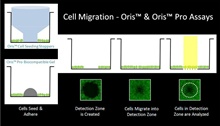Channels
Special Offers & Promotions
A Robust, Quantitative Alternative to the Scratch Assay
 New independent research demonstrates that the OrisTM Cell Migration Assay presents a superior quantitative, high throughput alternative to the scratch assay.
New independent research demonstrates that the OrisTM Cell Migration Assay presents a superior quantitative, high throughput alternative to the scratch assay.
Cell migration is integral to many physiological processes, including embryonic development, tissue regeneration, and wound healing. One assay commonly used to study cell migration is the scratch assay creating a cell-free gap, or "scratch", on a confluent cell monolayer. Whilst this method is popular, the inherent variability in how scratches are produced and physical damage to cells make it difficult to obtain quantitative and statistically valid measurements of cell migration. Furthermore it has been demonstrated that the "scratch" will damage any underlying extracellular matrix (ECM).
The OrisTM Cell Migration Assay has been shown, in comparative testing (1,2), to offer a superior alternative to the scratch assay, permitting formation of precisely placed and homogeneously sized cell-free areas into which migration can occur without releasing factors from wounded or dead cells.
During cell seeding, OrisTM Assays use silicon stoppers or a non-toxic biocompatible gel (BCG) to form a centrally located and temporary cell-free zone on cell culture surfaces in a 96 or 384-wells format. After removal of the stoppers or dissolution of the BCG, the migration of cells into the detection zone can be observed either in real time or after further experimental processing. This breakthrough product enables researchers to capture and quantify cell migration data while substantially improving assay efficiency and dramatically reducing assay costs.
Further information on OrisTM Assay Kits is available at www.amsbio.com/Oris-Cell-Migration-and-Invasion-Assays.aspx or by contacting AMSBIO on tel. +44-1235-828200 or email info@amsbio.com.
Founded in 1987, AMS Biotechnology (AMSBIO) is recognized as a leading international provider of unique & innovative products & custom services for life sciences research. The amsbio range includes over 23,000 polyclonal & monoclonal antibodies, peptides, recombinant proteins, extracellular matrix, molecular detection reagents, & tissue DNA, RNA, protein & microarray products. Key research areas include: apoptosis, cell invasion & migration, cell signaling, DNA damage, electrophoresis, glycobiology, posttranslational modification & stem cell biology.
References
1. Journal of Biomolecular Screening 2011, 16, pp155-163
2. http://www.amsbio.com/brochures/Oris_Scratch_Assay_Comparison.pdf
Media Partners


